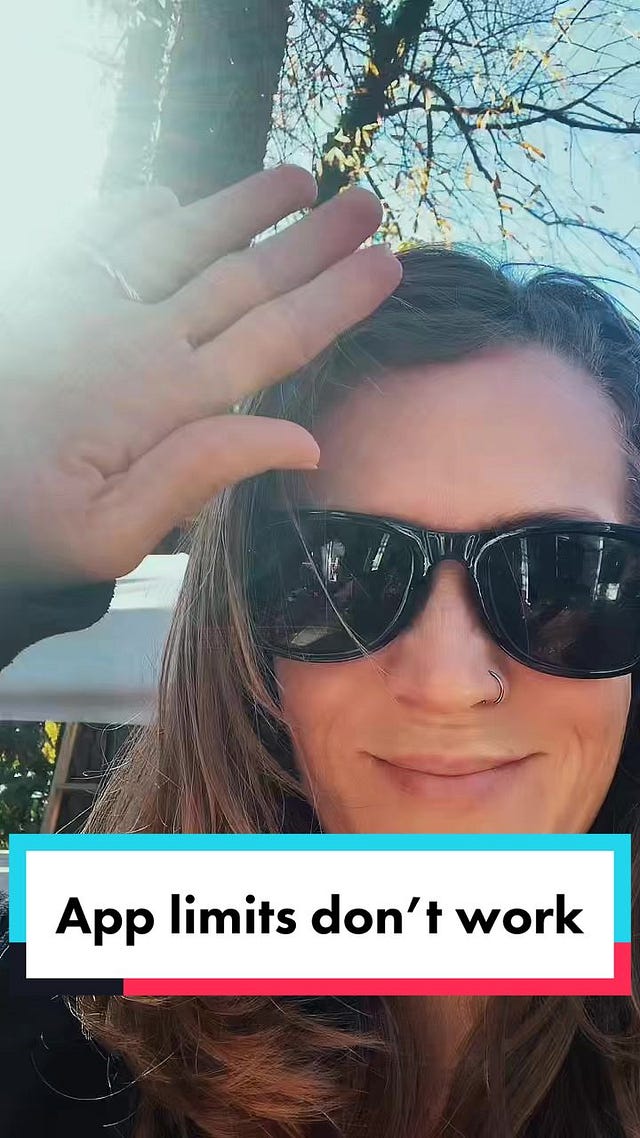I have recently set “app limits” on my phone and enabled the “downtime” function, which disables all apps (minus the phone function) for a scheduled time. (I do 8 p.m. to 7 a.m.) These are controls that are available to me within the phone’s operating system, and I’m here to tell you that THEY DO NOT WORK.
I know I’m not the only one who has come to a similar conclusion. Time and time again, I hear from people that they set time limits on apps that they are addicted to, and that they promptly disregard the messages telling them that time is up. Have you had that experience? These app limits are supposed to help you manage yourself, but the uncomfortable truth is that our addictions are impervious to such methods. Our phones are asking us to hold ourselves accountable, and let’s be honest – when has that ever worked? This is why people join Weight Watchers and writing groups – to be held accountable by others. If left to our own devices, we’d eat cheesecake all day and never write a word!
(Alright, I’m being a bit facetious, but you get my point.)
One of Apple’s newest tools is something called Lockdown Mode, which “enables an extreme level of protection that prevents malware from accessing your phone, blocking most message attachment types, FaceTime calls, and more.” It is only meant for a small section of users who may be targeted by nation-state cybersecurity threats.
Justin Cappos, associate professor of Computer Science and Engineering at NYU, says that Lockdown Mode reduces the risk of unknown security bugs, while making the phone experience “a little more inconvenient” for most users. In this CNBC article, I found it fascinating to read Cappos’ assertions that “the only visual changes he noticed were fonts appearing differently and the icons for health apps not displaying correctly.” The article goes on to say that “due to a very similar user experience and additional security benefits, [Cappos] plans to use Lockdown Mode as his default and only exempt apps if necessary.”
Our phones are designed to be super-convenient, beyond seamless – an extension of your own brain. Therefore, it’s by design that we become grossly addicted to these devices. If we find ways, like Cappos, to make our relationship with our phone a little less convenient, we can begin to break our close bond with this inanimate (and yet, so animate) device.
Using your phone on Lockdown Mode sounds like it would certainly do the trick in terms of making your user experience “stickier” and less convenient. And yet, I think it’s highly unlikely that the regular iPhone user will go to such lengths. It’s a tricky balance to strike. We love our phones because they make our lives so “easy,” and yet, their built-in convenience makes it easy to fall prey to their addictive design.
The fact of the matter is this: we cannot look to our phone to help us solve the problem that the phone creates. If we could simply use an app to overcome our addiction, that would be amazing! But that’s an easy solution for a very complicated problem.

 Tiktok failed to load.
Tiktok failed to load.Enable 3rd party cookies or use another browser
🧹Housekeeping
I’m in the process of fiddling with the newsletter and trying out some new ideas.
✍️What will stay the same: the weekly essay, a reflection of some aspect of our digital life.
🔥Something new: I added a paid subscription option. For now, the content will be the same for both paid and free subscriptions. I’m just giving readers the option of paying for my newsletter if they so desire!
🌀In the pipeline: A podcast! Stay tuned to learn more about “There’s An App For That!”, a podcast where I will speak with a wide variety of guests about staying sane in a digital world.
🗞️Article of the Week
The Power of a Casual Check-In Text, The New York Times (gift link)
A new study finds that taking the time to reach out to friends or acquaintances can have a real impact. Sometimes we avoid reaching out because we don’t want to bother people. But the truth is, the participants in this study were overwhelmingly appreciative of the small gesture. 🤗
“To be functioning at our best, we need to be in a connected state,” Dr. Marisa Franco said. “Just like you need to eat, like you need to drink, you need to be connected to be functioning well.”
✨My Takeaway:
We’re experiencing a loneliness crisis. Although we’re “connected” all day long via social media, those impersonal interactions do little to help us feel connected to other humans. Reaching out to someone in a direct and personal way (text, email, phone call) can go a long way in terms of strengthening social ties and creating a positive effect for both the sender and receiver.
🎵Song of the Week:
Wedding at Finisterre by Jens Lekman
I love a good story. I also love traveling. This song combines both! Brings me back to fall 2007 when I finished El Camino de Compostela at Finisterre. Also, themes of growing up and doors closing… Very timely for me these days.
Oh, please, distract me
From every life unlived
Every path I haven't taken
The heart's still a little kid






